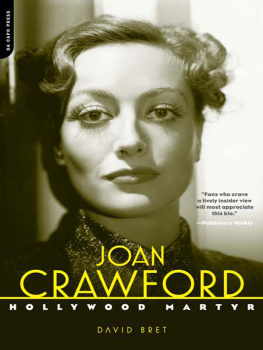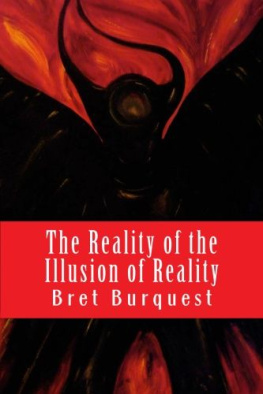David Bret - Doris Day: A Reluctant Star
Here you can read online David Bret - Doris Day: A Reluctant Star full text of the book (entire story) in english for free. Download pdf and epub, get meaning, cover and reviews about this ebook. year: 2014, publisher: Aurum Press, genre: Non-fiction. Description of the work, (preface) as well as reviews are available. Best literature library LitArk.com created for fans of good reading and offers a wide selection of genres:
Romance novel
Science fiction
Adventure
Detective
Science
History
Home and family
Prose
Art
Politics
Computer
Non-fiction
Religion
Business
Children
Humor
Choose a favorite category and find really read worthwhile books. Enjoy immersion in the world of imagination, feel the emotions of the characters or learn something new for yourself, make an fascinating discovery.

- Book:Doris Day: A Reluctant Star
- Author:
- Publisher:Aurum Press
- Genre:
- Year:2014
- Rating:3 / 5
- Favourites:Add to favourites
- Your mark:
- 60
- 1
- 2
- 3
- 4
- 5
Doris Day: A Reluctant Star: summary, description and annotation
We offer to read an annotation, description, summary or preface (depends on what the author of the book "Doris Day: A Reluctant Star" wrote himself). If you haven't found the necessary information about the book — write in the comments, we will try to find it.
Doris Day: A Reluctant Star — read online for free the complete book (whole text) full work
Below is the text of the book, divided by pages. System saving the place of the last page read, allows you to conveniently read the book "Doris Day: A Reluctant Star" online for free, without having to search again every time where you left off. Put a bookmark, and you can go to the page where you finished reading at any time.
Font size:
Interval:
Bookmark:

RELUCTANT SUPERSTAR
DAVID BRET

This book is dedicated to
Marlene, Barbara, Amalia, Axel and Les Enfants de
Novembre
Noublie pas
La vie sans amis cest comme un jardin sans fleurs
W riting this book would not have been possible had it not been for the inspiration, criticisms and love of that select group of individuals who, whether they be in this world or the next, I will always regard as my true family and autre coeur: Barbara, Irene Bevan, Marlene Dietrich, Ren Chevalier, Axel Dotti and Roger Normand, que vous dormez en paix; Montserrat Caball, Lucette Chevalier, Jacqueline Danno, Hlne Delavault; Tony Griffin, Betty and Grard Garmain, Annick Roux, John and Anne Taylor, Terry Sanderson, Charley Marouani, David and Sally Bolt, Dorothy Squires and Maria da Fe. Also a very special mention for Amalia Rodrigues, Joey Stefano, those hiboux and amis de foutre who happened along the way, and mes enfants perdus.
A deep debt of gratitude to Jane Donovan. And where would I be without Jeremy Robson and the munificent team at JR Books. And also, where would I be without my agent Guy Rose? Also to my wife, Jeanne, for putting up with the bad moods and for still being the keeper of my soul!
And the final chapeau for Mrs Kappelhoff s daughter, for having lived.
David Bret, February 2008
S he was known as the girl next doorthe archetypal, perennial virgin one could always be confident of taking home to Mum for Sunday tea. Her heyday years were lived wholly without scandal because the gossip columnists truly believed in the wholesome image promoted by Warner Brothers, who were, of course, only interested in using her to line their coffersand to be fair, they never saw her as anything but the dippy, happy-go-lucky blonde with the bubbly personality. In her memoirs, published in 1975, Doris Day revealed the tears of the clown, declaring her life had been nothing like the sunny excursion portrayed in most of her films. Yet in trying not to offend her readers and risk many of them losing the respect for her that had built up over the years, and on account of her strong, if not frequently misguided religious principles, she was not always entirely honest about herself and those around her. Rock Hudson, who appeared with her in a trio of phenomenally successful (so-called) sex comedies, claimed that beneath the giggles, she was just another lonely little child looking for help; also, that when riled she could out-curse any woman he had ever known with the exception of Elizabeth Taylor.
After watching the rushes for Love Me Or Leave Me, Ruth Etting refused to meet her, declaring Doriss portrayal of her was so inaccurate that it would be as if she was looking through a shattered mirror. Like Etting, Doris had the knack of always ending up with the wrong manthugs, crooks, thieves and rapists all flocked to her banner to ensure that she never went too long without being made to suffer. And in a similar way to Judy Garland, perhaps her nearest contemporary, looking back on her life she gives every impression that she actually enjoyed being dragged through the mire, along with the acts of contrition which followed from whosoever she was involved with at the time. Only now, with most of the characters in her Pirandello-style drama dead, can one dip into the archives (somewhat repressed at times) and reassemble the pieces to say what really happened.
Of course what we must never forget is that Doris Day is unique, inimitable and if not an authority on the human condition then certainly one where animals are concerneda comedic and dramatic genius, a sincere, consummate artiste the like of which we shall never see again.
I found Doris Day sexy in a very acceptable, very chaste way. She wasnt down and dirtyshe was above that and thats what made her a star.
Norman Jewison, director, 1989
L ike many of her contemporaries, much of what we know of her early life comes post-fame from Doris Day herself. With almost all the major players in the scenario now dead, it often becomes difficult to separate truth from hearsay. She was born Doris Mary Anne Von Kappelhoff on 3 April 1924 in Evanstown, Cincinnati, the third child of Frederick William and Alma Sophia Welz, Catholics of German descent, who were thought to have dispensed with the Von at the time of Hitlers rise to power. Kappelhoff on its own, Frederick declared, sounded Jewish, and as such would see the family discriminated against. Doris was the couples third child: a son, Richard, had died aged 2 in 1920 and Paul was born the following year. Her maternal grandparents, known only as Frau and Herr Welz, emigrated from Berlin to the United States some years before because her grandfather, a conscientious objector, wished to avoid military service. They used their savings to open a pretzel factory in the citys German quarter and various members of the family, including Alma and Frederick, lived in the apartments above.
Alma and Frederick are known to have fought a lotlargely on account of their differing musical tastes, which each of them wanted to pass on to their offspring. As a couple, they were totally incompatible. In her ghosted memoirs (Doris Day, Her Own Story by A. E. Hotchner, 1975) Doris describes her father as, A handsome man, tall, slender, thick auburn hair, large brown eyes topped by heavy auburn eyebrows, adding that he had had very little time for family life. A music teacher by profession, Frederick also directed the choir at St Marks Catholic Church. He appears to have been a strict disciplinarian, barring the front of the house from everyone, especially his family, when he was working in the music rooma tell-tale sign was that if his car was parked in front of the building, everyone had to use the back entrance. Doris describes Alma as very barrelhouse, into country music, parties and the local social calendar while her father preferred to stay at home, listening to opera on the radiothe heavier, the better.
From early on, Alma nurtured hopes for both of her children to have a stage career. Doris was named after one of her idols, silent star Doris Kenyon (18971979), forgotten today but a sizeable name in 1924 as Rudolph Valentinos leading lady in Monsieur Beaucaire. The two children were enrolled at Goldens School For Tap and then at Martins Ballet School, Cincinnati, where, in addition to dance they were taught comportment. For his part Frederick aspired to a more classical future and attempted to teach them the piano and violin, failing miserably where Doris was concerned.
In 1934 Frau Welz died, bequeathing the pretzel factory to her sons, Frank and Charley. Alma and Frederick were devastated and the tragedy appears to have decimated Almas sex-drive, resulting in Frederick embarking on a series of affairs, the first of them with his wifes best friend. Doris said she listened to them having sex in the room next to hers and then cried herself to sleep. Alma threw him out of their apartment and such was the scandal when she announced why she was divorcing him that most of Fredericks music students deserted him and he was fired from his directing post at St Marks Church.
The bottom dropped out of Doris world and her idyll was shattered. It was the only ambition I ever had, she said. Not to be a dancer or Hollywood movie star but to be a housewife in a good marriage. She would go on to achieve one ambition with flying colours but sadly the other one would pass her by, largely on account of her own bad choices in men.
Next pageFont size:
Interval:
Bookmark:
Similar books «Doris Day: A Reluctant Star»
Look at similar books to Doris Day: A Reluctant Star. We have selected literature similar in name and meaning in the hope of providing readers with more options to find new, interesting, not yet read works.
Discussion, reviews of the book Doris Day: A Reluctant Star and just readers' own opinions. Leave your comments, write what you think about the work, its meaning or the main characters. Specify what exactly you liked and what you didn't like, and why you think so.









